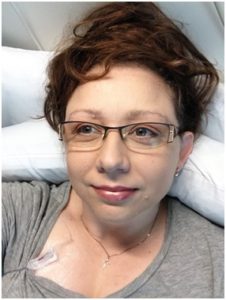Jodie’s Story
Jodie, 45, Brisbane, is a happily married mother to two  teenage girls who have special needs. She has battled depression since the age of 36, which she is managing with the assistance of medication.
teenage girls who have special needs. She has battled depression since the age of 36, which she is managing with the assistance of medication.
Following a traumatic and arduous battle with blood cancer in 2006, Jodie was diagnosed with clinical depression and anxiety in 2007. She attributes her cancer diagnosis as the trigger for her depression.
After completing her cancer treatment, Jodie was unable to complete basic, everyday tasks, which culminated in a “major meltdown.”
Fortunately, with invaluable support from her husband and parents, Jodie received the necessary care and medication that she required to manage her depression.
This is her story.
“I liken depression to a big, black cloud hovering over your heart and mind. It gives you a feeling of doom, or no hope at all,” said Jodie.
Jodie learned she was in the advanced stages of Non-Hodgkin’s Lymphoma in ER following a delayed diagnosis. To save her life, she underwent a gruelling treatment regimen, including emergency radiotherapy, which she says was both physically and mentally tough. She then experienced what she describes as a major meltdown.
“My depression set in around two weeks after my treatment ended, when my mind had time to stocktake what I had endured.
“Depression renders you unable to function, as both a wife and mother, because you’re so depressed about your life and future, and what is happening to you at the time,” Jodie said.
“You can’t perform the most normal jobs, such as washing, cleaning or looking after the kids. You literally can’t function, and would rather stay in bed all day.
“When I was diagnosed with depression, I started medication immediately. The medication took a couple of weeks to kick in, after which I felt really good, like a new person.
“During this time, I continued to see my hospital-based psychiatrist, with whom I discussed how I was feeling, my symptoms of depression and what I was going through,” said Jodie.
Following another blood cancer relapse in 2008, Jodie continued to see her GP, and a hospital-based psychiatrist, who increased her medication dosage.
In 2014, Jodie required a bone marrow transplant to combat a third blood cancer, which had significant physical side-effects, bringing on new and difficult diseases and pain. After this third effort to save Jodie’s life, her depression medication needed to be elevated once again.
To this day, Jodie continues to see her GP and haematology team to manage both her depression, and blood cancer, to ensure she focuses on both her physical and mental health.
Jodie is participating in the Australian Genetics of Depression Study, a ground-breaking international collaboration exploring the genetic risk factors associated with depression, and how genes influence one’s response to treatment. QIMR Berghofer Medical Research Institute is leading the Australian arm of the research study, and Jodie genuinely hopes her contribution will allow experts to unravel more answers to help combat depression.
She believes both genetics and environmental factors contribute to the development of depression.
“I’m absolutely convinced there are genes associated with depression. I also think the illness can be triggered by trauma or circumstance as well.
“If people can confirm a genetic link or familial predisposition to depression, and can anticipate what may lie ahead, and prepare for such, then this study will prove very productive,” Jodie said.
“The Australian Genetics of Depression study offers people living with depression, the opportunity to genuinely help others, because expert identification of clues and markers through this research could help to curb the onset of depression.”
Join Jodie, and participate in the Australian Genetics of Depression Study today – http://www.geneticsofdepression.org.au/
